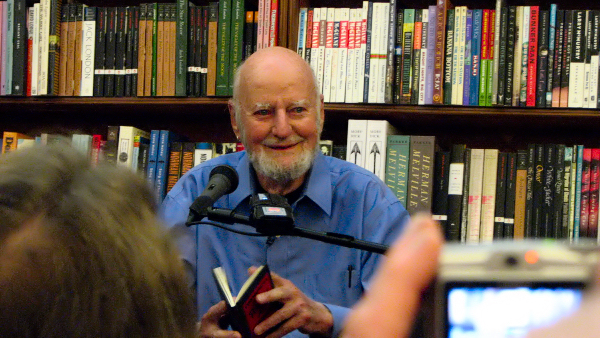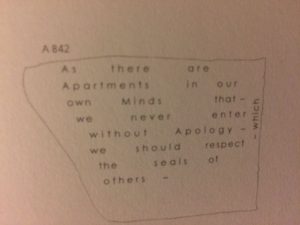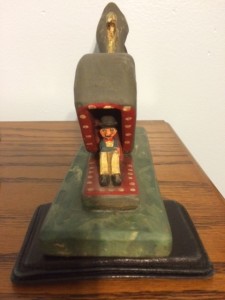
Attending a season of plays by the Prison Performing Arts Program in Missouri, I have witnessed the achievements of incarcerated adults in the performance of classical theater with individual flair. I have seen versions of
Macbeth,
Pride and Prejudice, and
Animal Farm performed in the spirit of hope and recovery. I have listened to the personal stories of the performers, how they have embraced collaboration by learning to trust their fellow inmates in a common effort. I have heard their guileless tales of redemption.
A similar narrative is told by Margaret Atwood in her novel Hag-Seed set in a fictional prison in contemporary Canada. Felix Phillips, a has-been director, has swallowed pride enough to direct the incarcerated and teach a class in drama. Considering a Shakespearian play to perform within the walls of a prison invites some traditional choices: the lessons of ambition in MacBeth, the quality of mercy in The Merchant of Venice, or the comedy of amateurs in performance of Midsummer’s Night’s Dream.
Not so much The Tempest. In the play, a shrewd magician named Prospero plans revenge on his enemies, who abandoned him on an island. The ultimate prisoner of Prospero’s island is Caliban, often referred to as “the monster” or “hag-seed” (alluding to his mother, the witch Sycorax). The element of revenge and the character of the detestable prisoner would not reinforce the theme of redemption you would hope for in a prison performance.
Rarely has a Shakespearian character been imagined with more distaste than the imprisoned figure of Caliban. Inmates would certainly not identify with him. Or would they? In Atwood’s novel, the monster is improbably redeemed. Not so much in the performance of the play, but in the imagined post-mortem, where each acting team gets to imagine how their assigned character emerged following the final curtain.
After his class’s final video-taping of The Tempest, Felix breaks the actors into teams and charges them with imagining the fate of their assigned characters. The leader of Team Hag-Seed, Leggs, summarizes his group’s conclusions following their production.
Hag-Seed, I mean Caliban–nobody’s on his team. Even his so-called friends and allies, those two drunk assholes–they’re not loyal to him, they make fun of him and call him names, they’re out to make a buck off him. So inside the play, he don’t have a team.” [ Hag-Seed 270]
Leggs and his team propose three possible fates for Caliban, the first two predictable for those who only see the monster in Caliban. “But that was too dark for us,” says Leggs. His team speaks hopefully for redemption.
Why should the others in this play get a second chance at life, but not him? Why’s he have to suffer so much for being what he is? If like he’s you know, black or Native or something. Five strikes against him from Day One. He never asked to be born. [272]
So Leggs spins a tale of redemption for Caliban, something that could only come out of a culture of punishment and struggle for rehabilitation. He invents a scenario in which the master sorcerer Prospero is actually the father to Caliban, but does not acknowledge him. Instead he apprentices Caliban in culture and sorcery, but he has to imprison him when he tries to take advantage of Prospero’s daughter, Miranda.
But every prisoner has his own version of a his crime, so Leggs says,
but whose fault was it anyway, letting Miranda prance around in full view? Prospero should’a seen it coming. Should’a locked her up, if it was that important. Prospero should eat some of the blame for that number.[273]
This is perhaps a strong measure of rationalization in Leggs’ version, Even the master magician Prospero has things to learn in a Shakespearian comedy. Team Caliban quotes Shakespeare’s own dialogue in support of Caliban’s redemption:
But, by the end, Prospero’s learning that maybe not everything is someone else’s fault. Plus he sees that the bad in Caliban is pretty much the same as the bad in him. So he owns up: “This thing of darkness I acknowledge mine.” That’s what he says and that’s what he means. [274]
Literary critics have hung their interpretations on less textual support than this inference that Prospero is the actual father of Caliban so Felix, director and instructor, accepts the interpretation. Later, continues Leggs, Prospero will set up Caliban as a musician in Milan, and the converted monster will make his fame in a musical group called “Hag-Seed and the Things of Darkness.”
The post-mortems of The Tempest in Hag-Seed prove that the Bard has much to teach 21st Century inmates and, moreover, embittered directors with an ax to grind against treacherous rivals. The actors, as well as Felix, gain some enlightenment about their predicament, and one of them even gets a shortened sentence on Felix’s recommendation.
Atwood’s novel is a tribute to the rehabilitative potential of theater. The “hag-seed” becomes the celebrated musician, and the director is restored to his embezzled position in the summer theater. The inmate actors not only have acquired employable skills, they have the bravado of free men, which they render in a song they composed for Felix:
Freedom, high-day, High-day freedom! Freedom, high-day freedom!
Get outta my cage, now I’m in a rage–
No more dams I make for fish, Nor fetch in firing
At requiring.
As Leggs’ extra-credit song continues, we recognize this is not just about Caliban, but about the “returning citizens,” many of whom enter society with a chip on their shoulders. They have paid their debt, and they want to be accepted as equals by the free society. Their personal dignity has been restored by their theatrical achievement.
Nor scrape trenchering, nor wash dish;
Ain’t gonna any more like your feet
Or walk behind you on the street,
Ain’t gonna get on the back of the bus,
And you can give our land right back to us! (277-78]
It reminds me of the outcomes of Prison Performing Arts. One is the rehabilitation of the incarcerated, the other the rehabilitation of the audience. We are also better citizens for having witnessed their achievements. If we accept Shakespeare’s claim that, “All the world’s a stage,” these performers are prepared for a world that has also been prepared for them. We can welcome the company of returning citizens to the stage of free people.



 Attending a season of plays by the Prison Performing Arts Program in Missouri, I have witnessed the achievements of incarcerated adults in the performance of classical theater with individual flair. I have seen versions of Macbeth, Pride and Prejudice, and Animal Farm performed in the spirit of hope and recovery. I have listened to the personal stories of the performers, how they have embraced collaboration by learning to trust their fellow inmates in a common effort. I have heard their guileless tales of redemption.
Attending a season of plays by the Prison Performing Arts Program in Missouri, I have witnessed the achievements of incarcerated adults in the performance of classical theater with individual flair. I have seen versions of Macbeth, Pride and Prejudice, and Animal Farm performed in the spirit of hope and recovery. I have listened to the personal stories of the performers, how they have embraced collaboration by learning to trust their fellow inmates in a common effort. I have heard their guileless tales of redemption.







